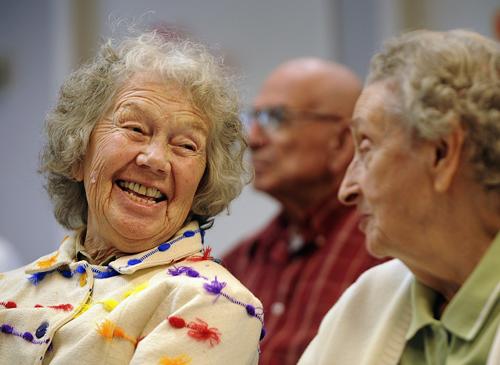Will games help dementia?

Shauna Bittle, The Associated Press
September 18, 2008
GENEVA, Ill. – He would drive all the way from DeKalb to Peoria to visit his mother, but sometimes a heartfelt hello would take the back seat to a TV game show.
“If I arrived at the time of Jeopardy, I’d have to wait to talk to her. I figured there must be some strength in the game,” said Alan Robinson.
That turned out to be a good lesson for Robinson, and it became the impetus behind a game that’s caught on at several DeKalb-area senior centers.
Teaming with a computer technician three years ago, Robinson invented a trivia game he calls Acuity, which offers categories of questions at different skill levels and point values. The game is available online at www.acuity.ws.
The first version of Acuity was projected from a computer onto a wall for everyone in the Arden Courts activity room to play. At its debut, “they had more darn fun,” said Robinson.
Get The Daily Illini in your inbox!
Robinson’s initial visits to the Alzheimer’s assisted-living community in Geneva went over well.
“They were fabulous,” said Arden Courts Executive Director Pam Sebern. “He was like Bob Barker. The game seemed to help people with their confidence and their interaction level. It was fun, too.”
Social interaction might be one of the keys to keeping the brain in shape as we age, according to Art Kramer, a professor at the Beckman Institute: Human Perception and Performance group at the University of Illinois at Urbana-Champaign.
“Time with friends and/or family members is important,” said Kramer. Physical activity and learning new activities can play a role as well, he said.
Kramer’s research shows that for seniors, simply walking 45 minutes to 60 minutes three times a week can help improve memory skills.
Still, 33 percent to 40 percent of the elderly who are functioning normally have the pathology of Alzheimer’s, said Dr. Robert Wilson, a professor of biological and neuroscience at Rush University Medical Center in Chicago.
“Those with higher levels of participation in cognitively stimulating activities are less likely to manifest signs of Alzheimer’s and dementia,” he said.
Wilson is in the midst of observational, longitudinal studies, which began in the mid-1990s. His research follows three groups of seniors: elderly in Chicago’s Morgan Park, Washington Heights and Beverly neighborhoods; a more general group of retirees; and men and women in religious orders.
The latter is similar to research being conducted by the University of Kentucky, which is keeping tabs on more than 600 nuns. Thus far, the study shows being educated, having a positive outlook, a diet rich in folic acid and having some sort of intellectual stimulation may play a role in warding off signs of Alzheimer’s and dementia.
Keeping the mind active by various means, including reading, seems to have a benefit. The key is to do as much as one can tolerate and do it on a regular basis, said Wilson.
While Wilson said research isn’t yet conclusive, some companies are offering products for aging baby boomers looking to work out their brains. According to a Bloomberg report, that market will grow from around $225 million to about $2 billion in less than 10 years.
Posit Science in California is one company that tests and designs programs related to keeping the mind sharp.
Nintendo has a computer game series called Brain Age, which first was created to keep the minds of Japan’s aging work force honed.






